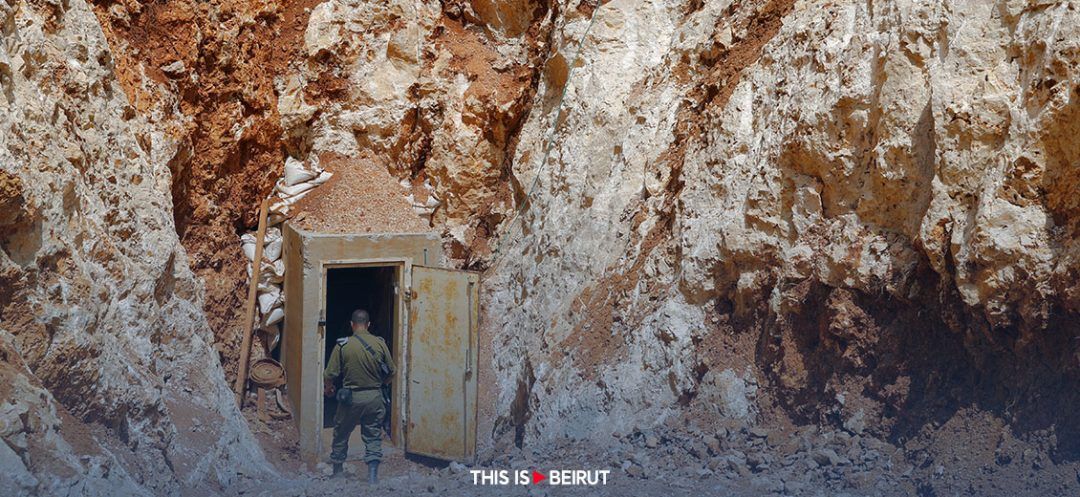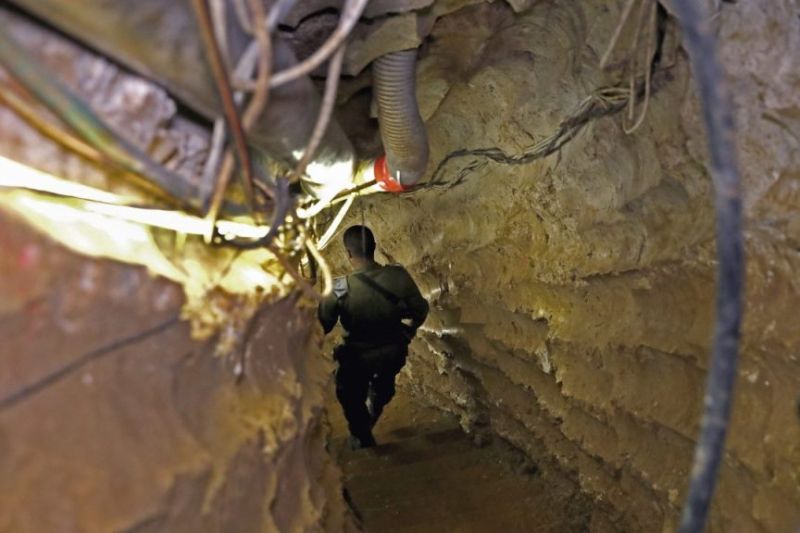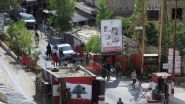
Hezbollah's network of secret tunnels in Lebanon is "more sophisticated" than that of Hamas in Gaza.
According to an article published on Sunday in the French daily Libération, "Since the 1980s," the pro-Iranian militia, whose "military power is far superior to that of Hamas, has been building, with the help of North Korea, an underground defense system in anticipation of an Israeli invasion." This would be "several hundred kilometers long, with ramifications as far as Israel and probably as far as Syria."
Moreover, on October 8, 2023, the date on which Hezbollah opened the front in southern Lebanon in support of Hamas in its war against Israel, the pro-Iranian militia broadcast on the X platform "a video staging another Israeli nightmare: a—fictitious—attack in the Galilee carried out by the elite Radwan unit via a tunnel from Lebanon,” reads the article in Libération.
Interviewed by the daily, General Olivier Passot, Associate Researcher at France’s Institute for Strategic Research at the Military School (IRSEM) and former chief Liaison for the United Nations Interim Force in Lebanon (UNIFIL), says that "as early as the 1960s, perhaps even earlier, Palestinian groups who had taken refuge in Lebanon and were carrying out rocket attacks and incursions into northern Israel began to dig in. Hezbollah took over."
According to the daily, there is "no question of digging in the sand and laying concrete as Hamas later did to create the Gaza subway, which includes almost 1,000 kilometers of tunnels. In southern Lebanon, the rock has to be drilled by hand, either with jackhammers or with hydraulic machines, which are quieter,” the Libération article stresses, noting that "every worker can dig an average of 15 meters per month."
Also, according to the daily, "the Israeli research center Alma is investigating from open sources (maps found on the Internet, videos of construction work, photos of vans in underground junctions, etc.) what it called, in a report published in 2021, the land of tunnels.”

According to the Center's researchers, after the July 2006 war with the Hebrew state, Hezbollah "created a defense plan in the event of an Israeli invasion, with dozens of operational centers equipped with local underground networks and inter-regional tunnels linking the nerve centers of Beirut, the Bekaa and southern Lebanon.”
In South Lebanon, "The cumulative length of the tunnels would reach several hundred kilometers—the researchers have put online the supposed route of a 45-kilometer gallery.”
"Israeli researchers have identified proximity tunnels, simple corridors that would enable elite Shiite troops to carry out hit-and-run attacks on Israeli camps, as in the video released by Hezbollah, and larger, tactical tunnels designed to enable Iranian-made Fateh-110 short-range ballistic missiles to be fired from underground," Libération adds.
What's more, "In a report published in June 2023, Alma also mentions the existence of explosive tunnels. Dug under strategic points, sealed and left without detectable activity for years, they are filled with explosives that can be detonated at a moment's notice to create a devastating and terrifying earthquake, landslides and deluge of earth and stones—a tactic much used during the First World War," Libération reports.
"In December 2018, Israel announced that it had discovered six attack tunnels dug some 40 meters deep beneath the Blue Line,” the daily recalls, pointing out that one of the aims of shelling South Lebanon with phosphorus bombs "was to set fire to the pine groves to uncover underground exits—at least a dozen have been photographed and bombed, triggering, at worst, overpressure and a landslide over a few meters."
"Even if the Lebanese authorities deny their existence, the entrances to the most important tunnels are said to be hidden inside private properties, such as large farms or factories, making it possible to bring in machinery and evacuate earth without attracting attention," General Olivier Passot says.
According to an article published on Sunday in the French daily Libération, "Since the 1980s," the pro-Iranian militia, whose "military power is far superior to that of Hamas, has been building, with the help of North Korea, an underground defense system in anticipation of an Israeli invasion." This would be "several hundred kilometers long, with ramifications as far as Israel and probably as far as Syria."
Moreover, on October 8, 2023, the date on which Hezbollah opened the front in southern Lebanon in support of Hamas in its war against Israel, the pro-Iranian militia broadcast on the X platform "a video staging another Israeli nightmare: a—fictitious—attack in the Galilee carried out by the elite Radwan unit via a tunnel from Lebanon,” reads the article in Libération.
Interviewed by the daily, General Olivier Passot, Associate Researcher at France’s Institute for Strategic Research at the Military School (IRSEM) and former chief Liaison for the United Nations Interim Force in Lebanon (UNIFIL), says that "as early as the 1960s, perhaps even earlier, Palestinian groups who had taken refuge in Lebanon and were carrying out rocket attacks and incursions into northern Israel began to dig in. Hezbollah took over."
According to the daily, there is "no question of digging in the sand and laying concrete as Hamas later did to create the Gaza subway, which includes almost 1,000 kilometers of tunnels. In southern Lebanon, the rock has to be drilled by hand, either with jackhammers or with hydraulic machines, which are quieter,” the Libération article stresses, noting that "every worker can dig an average of 15 meters per month."
Also, according to the daily, "the Israeli research center Alma is investigating from open sources (maps found on the Internet, videos of construction work, photos of vans in underground junctions, etc.) what it called, in a report published in 2021, the land of tunnels.”

According to the Center's researchers, after the July 2006 war with the Hebrew state, Hezbollah "created a defense plan in the event of an Israeli invasion, with dozens of operational centers equipped with local underground networks and inter-regional tunnels linking the nerve centers of Beirut, the Bekaa and southern Lebanon.”
In South Lebanon, "The cumulative length of the tunnels would reach several hundred kilometers—the researchers have put online the supposed route of a 45-kilometer gallery.”
"Israeli researchers have identified proximity tunnels, simple corridors that would enable elite Shiite troops to carry out hit-and-run attacks on Israeli camps, as in the video released by Hezbollah, and larger, tactical tunnels designed to enable Iranian-made Fateh-110 short-range ballistic missiles to be fired from underground," Libération adds.
What's more, "In a report published in June 2023, Alma also mentions the existence of explosive tunnels. Dug under strategic points, sealed and left without detectable activity for years, they are filled with explosives that can be detonated at a moment's notice to create a devastating and terrifying earthquake, landslides and deluge of earth and stones—a tactic much used during the First World War," Libération reports.
"In December 2018, Israel announced that it had discovered six attack tunnels dug some 40 meters deep beneath the Blue Line,” the daily recalls, pointing out that one of the aims of shelling South Lebanon with phosphorus bombs "was to set fire to the pine groves to uncover underground exits—at least a dozen have been photographed and bombed, triggering, at worst, overpressure and a landslide over a few meters."
"Even if the Lebanese authorities deny their existence, the entrances to the most important tunnels are said to be hidden inside private properties, such as large farms or factories, making it possible to bring in machinery and evacuate earth without attracting attention," General Olivier Passot says.
Read more



Comments